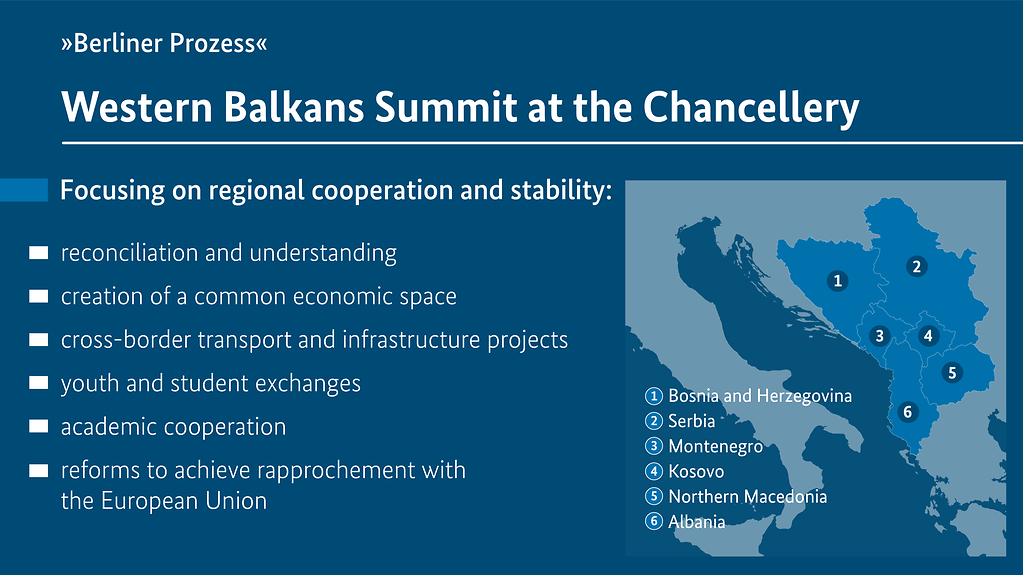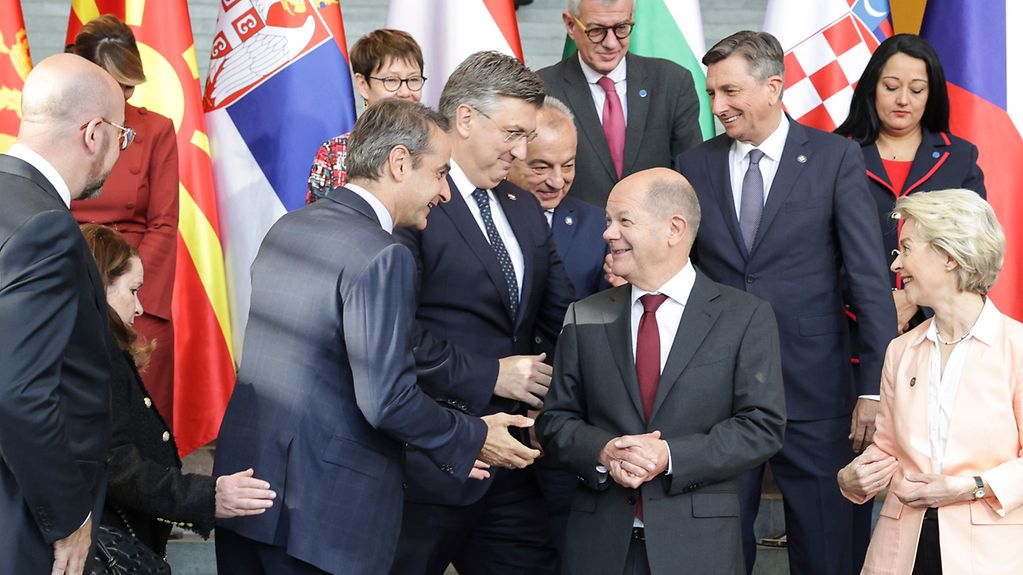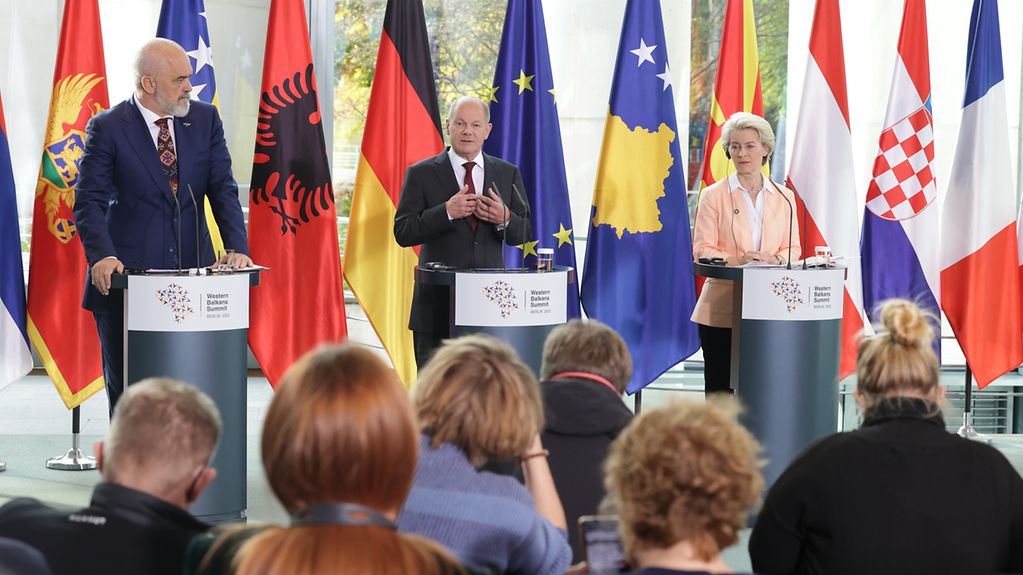Aiming to join the EU
Germany is going to continue to promote the EU accession of the six Western Balkan states, said Federal Chancellor Scholz at the Western Balkans Summit in Berlin. He pointed out that further European integration had become all the more important in view of Russia’s war of aggression against Ukraine.
4 min reading time

Expand cooperation among the Western Balkan states and create a basis of mutual trust – this is what the Berlin Process is seeking to achieve.
The graphic is entitled Western Balkans Summit at the Federal Chancellery. Underneath it says: the focus is on regional cooperation and stability. Below this, the following points are listed: reconciliation and understanding; creation of a common economic space; cross-border transport and infrastructure projects; youth and student exchanges; academic cooperation; reforms to achieve rapprochement with the European Union. Next to this there is a map of the region. The countries shown are Bosnia and Herzegovina, Serbia, Montenegro, Kosovo, North Macedonia and Albania.
Photo: Federal Government
The six Western Balkan states belonged in the EU, said Federal Chancellor Scholz at the Western Balkans Summit at the Chancellery on Thursday, building on the speech about Europe he had held in Prague at the end of August. Scholz stressed that the six states were a part of Europe and the European family, which was why he was advocating for enlargement of the European Union.
Who are the Western Balkan states?
The term “Western Balkans” has political as well as geographical significance. At the EU summit in Vienna in 1998, it was introduced into the EU terminology to refer to those states in the Balkan peninsula which are not yet members of the EU. For this reason, alongside Albania, the Yugoslav successor states Bosnia and Herzegovina, Kosovo, North Macedonia, Montenegro and Serbia are counted as Western Balkan states, but not Slovenia and Croatia, which joined the EU in 2004 and 2013 respectively.

In addition to representatives of the six Western Balkan states, the conference was also attended by the EU Commission President and the EU Council President.
Photo: Federal Government/Carstensen
Berlin Process as a motor
Scholz expressed his great pleasure to see the Prime Ministers of all six Western Balkan states in Berlin, pointing out that the so-called Berlin Process was key to the success of this EU enlargement. It was the third time the Berlin Process was hosted by Germany since 2014, as the Federal Chancellor highlighted.
What is the Berlin Process?
The Federal Government established the so-called Berlin Process back in 2014, when the Western Balkans conferences were initiated. The goal of this series of annual conferences is to promote peace, security and stability in the Western Balkan states and to support development in the region. The Berlin Process is designed to contribute to improving cooperation among the Western Balkan states.
The Federal Chancellor announced that Albania with its Prime Minister Edi Rama would be next in line to host the Berlin Process conferences. This was why Scholz presented the results of the Summit together with Edi Rama, Prime Minister of Albania, and Ursula von der Leyen, President of the European Commission.

Federal Chancellor Scholz at the joint press conference with Albania’s Prime Minister Edi Rama and EU Commission President Ursula von der Leyen.
Photo: Federal Government/Carstensen
Reforms are required for EU integration
Further development and European integration of the Western Balkans was all the more important against the backdrop of Russia’s brutal war of aggression against Ukraine, Federal Chancellor Scholz stressed. He noted that reforms would be required for this – “in the EU itself, but in particular in the region, especially concerning the rule of law and environmental standards”.
It was also necessary to advance regional cooperation and to resolve conflicts among the six countries that had been smouldering for far too long, Scholz added: “Better regional cooperation of the Western Balkan states is key when it comes to accelerating rapprochement with the European Union.”
The Berlin Process is a success story
The Berlin Process had successfully promoted links in the region across all levels since 2014 – with new roads and energy connectors, but also by bringing people together, the Federal Chancellor summarised: “It has thus strengthened the economy, and has specifically helped to improve neighbourly relations and to promote reconciliation in the region.”
Three new mobility treaties
The Summit at the Chancellery focused very concretely on the creation of a common regional market that was compatible with the rules of the European Union and in which all countries of the region would be involved as equal partners, said Scholz. He congratulated the Western Balkan states on signing three mobility treaties that had been realised with support from the Regional Cooperation Council and the Federal Government.
“This is a huge success for all citizens of the region! And it shows that the six Western Balkan states are serious about their commitment, and are drawing closer to the EU also with regard to regional cooperation. The European project is and always has been about joint progress, after all,” the Federal Chancellor said.
Treaties for better coexistence
The three new treaties that had now been signed would enable the citizens of the region to travel with identity cards, Scholz explained, adding that the Western Balkan states had also agreed to recognise each other’s academic and professional qualifications. “It is those very concrete steps that improve the lives of individuals and bring the region closer together,” Federal Chancellor Scholz emphasised.
Energy: promoting climate protection
The participants had also agreed on an important declaration in the area of energy policy, said Scholz. The Western Balkan states had committed themselves to closer cooperation to allow for greater energy security and agreed to determine climate protection measures in order to meet the 2030 target.
Federal Chancellor Scholz promised the Western Balkan states the support of the other participants of the Berlin Process – “in the short and the long term, to help them weather this energy crisis and focus on renewable energies”.
Germany provides support
Germany was contributing to this considerably through the development bank KfW, by granting up to 500 million euros worth of loans in the current energy crisis at short notice, the Federal Chancellor said. He continued that in the medium term, Germany was providing up to 1 billion euros worth of support up to 2030 to help fund the energy transition of the Western Balkan states.